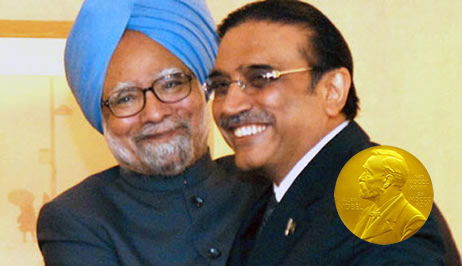What was advertised as a private lunch between two world leaders may have actually been an international summit of historic consequence. Against all odds and the outcry of groups like PTI and Difa-e-Pakistan Council, President Zardari landed in Delhi on Sunday and became the first Head of State of Pakistan to meet with his Indian counterpart in almost a decade. As much as the president’s trip was unprecedented, though, it was not unexpected. Actually, it was only the latest in an ongoing series of efforts by President Zardari to transform hostility and tension into peace and cooperation between our two nations.
According to news reports, the issues discussed by the two leaders included how to resolve conflicts in Siachen and Kashmir as well as Sir Creek estuary. Sadly, these talks were held against the backdrop of tragedy when 135 soldiers were martyred in an avalanche that engulfed a military complex at the entrance to the Siachen glacier.
Dawn termed the tragedy as the result of a ‘pointless conflict’, referring to the decades-old military standoff at Siachen which started with Indian encroachments in 1984 – almost 30 years ago. The standoff has continued because India insists that “any Siachen withdrawal agreement must include a record of its posts on what is known as the Actual Ground Position Line (AGPL)”. Obviously, this is a non-starter. It would be as if Pakistan Army had refused to pull back from its advanced position in Kargil unless India recognised a change in the Line of Control. What is needed is not intransigence, but a willingness to find compromises that develop assurances that allow both sides to ease their forces back to pre-1984 positions. That is where Zardari shines.
President Zardari is not a military strategist, he is a businessman. Ironically, this may be exactly why he is able to facilitate a change in direction in the age old conflict. Unlike the art of war fighting, business is rarely a ‘zero-sum game’ in which one side’s gain is the other side’s loss. In business, both sides look for mutually beneficial transactions. When a deal is made, both buyer and seller come out ahead because both have something that they wanted.
Geopolitics is often misunderstood as a ‘zero sum game’ by those who are unwilling or unable to think creatively about finding solutions. Military strategists used to thinking in terms of ‘lines of control’ and land gains are unable to see any other prize besides specific areas of land. Status quo political parties are unwilling to let go of the conflicts that keep them relevant.
Nobody expects a miracle. But even The Nation sees Zardari’s trip as a potential game-changer.
Despite the decades-long boundary dispute, India and China, the two rising Asian powers, have managed to scale up bilateral ties to over $70 billion and set an ambitious target of $100 billion by 2015.
Compared to that, bilateral trade between India and Pakistan stood at a mere $2.7 billion, with trade balance heavily in favour of India. The Confederation of Indian Industries (CII) has predicted that trade may touch $10 billion by 2015, if the barriers are removed.
Singh underlined this new spirit of pragmatism in ties after talks with Zardari. “We are willing to find practical, pragmatic solutions” to all issues dogging their ties “and that’s the message that Zardari and I would wish to convey,” he said.
In 2009, the Norwegian Nobel Committee awarded the Nobel Peace Prize to US President Barack Obama “for his extraordinary efforts to strengthen international diplomacy and cooperation between peoples”. Asif Zardari is not an international celebrity of the calibre of Barack Obama, but that makes his efforts to end the decades long nuclear standoff in South Asia that much more compelling. The Nobel Prize is not a popularity contest, but a recognition of the extraordinary efforts of individuals to transform hostility into peace. After decades of tension, four wars, tit-for-tat skirmishes and a nuclear standoff, President Zardari has changed the direction of Pakistan-India relations. It will be interesting to see if the Nobel Committee has noticed.
![]()







Umm, he didn’t meet his counterpart. His counterpart would be President Patil. But I do say yay for peace with India. Yay!
I feel Zardari will make history and outshine all previous Leaders. He is an expert negotiator who makes the other side feel like a winner and thus they agree to his proposal. Which in fact a win win situation for all. If he manages to settle Siachen and Sir Creek he will deserve to be considered for Noble Peace prize. 99pc technicals details of these pieces of Land were sorted out long ago. All is required is to sing the dotted line. Manmohan Singh’s suggestion in Tokyo that he would like to come to Pakistan to sign something concrete is a hint that he will sign these two deals and make Zardari very popular.
I believe we had a best leader zardari tamper , nation need some one who can bring harmony among the nation and in the world in general , he is best man , I support him for nobel case n
I think President Zardari is kind of a leader with great patience and tolerance who has commanded the situation extremely well under the present turbulant situation. He must be appreciated for his efforts in normalisation of relations to achieving peace in the region.